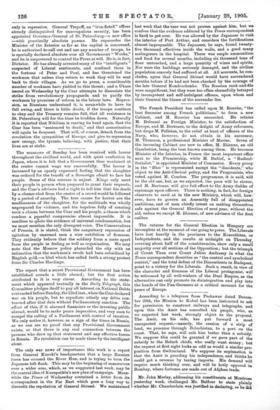last week, that they agreed in principle, and that Mr.
Balfour advocated his objects as strongly as any Tariff Reformer could desire. As for the policy of the Government, he charged them with never having thought out their problems, whether in regard to the war, Army reform, Irish land legislation, the Sugar Convention, or Parliamentary procedure. Much of Mr. Morley's criticism was just and well founded, but we cannot for a moment endorse the curious argument he employed in refer- ence to the question of redistribution. He admitted that Ireland was largely over-represented in the Commons, but before her representation was cut down to her exact numerical propor- tion, one thing must be remembered as "absolutely relevant." In the House of Lords, "which was coequal in power with the Commons," there was not one single direct representative of that portion of Ireland which sent an overwhelming majority of Irish Members to the House of Commons.























































 Previous page
Previous page